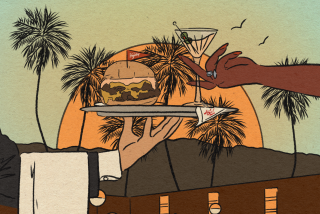It’ll quench your thirst, of course
I’ve heard that ionized water can cure whatever ails you. Sounds like snake oil to me.
MIKE
Los Angeles
---
The product: Ionized water isn’t exactly snake oil. (These days, very few beverages are snake-based.) But because water ionizers can cost several thousand dollars, consumers are right to wonder what they’re getting.
Water ionizers attach directly to your kitchen faucet. The devices will filter water, infuse it with minerals and zap it with an electric current. The result: an alkaline (high pH) brew that, according to manufacturers, is buzzing with free electrons and electrically charged ions. Ionizers, popular in Korea and Japan, are widely available on the Internet.
The claims: Websites selling ionizers often use head-spinning scientific terms such as “negative oxidation reduction potential” and complex diagrams seemingly ripped from college chemistry textbooks. But the basic claims are straightforward. Marketers promote ionized water as a powerful antioxidant that can slow aging and prevent disease. (The “scientific” explanation is that electrons in the water mop up dangerous free radicals produced by oxidation.)
Marketers also claim that ionization helps hydrate the body by breaking large water “clusters” into smaller, more readily absorbed clumps -- thus, we are told, actually making “wetter water.”
Many health claims focus on the benefits of alkaline water and the corresponding evils of acid. Marketers warn that modern diets cause a toxic buildup of acid -- enough to corrode cells, age the body and cause cancer, arthritis and practically any other disease imaginable. As one site puts it, “Almost all of us are slowly dying of excess acid.”
The proposed antidote, of course, is alkaline water. If you believe that “keeping yourself alkaline is your first line of defense in fighting any disease,” a $4,000 ionizer may seem like a good investment.
Bottom line: Ionized water might cure thirst, but any other benefits seem extremely far-fetched, says Thomas Wheeler, a retired professor of biochemistry at the University of Louisville. The water has never been tested in well-controlled clinical trials. But the claims, Wheeler says, don’t even make scientific sense.
For starters, Wheeler says, any negative ions you drink would immediately bind with positive ions. And even if the negative ions stuck around, they could never act as antioxidants or attack free radicals. “The body relies on molecules like vitamin E and beta carotene for antioxidants. The idea that you could just drink extra electrons is ridiculous.”
The claim that ionized water is somehow more easily absorbed than tap water is equally absurd, Wheeler says. Although water molecules do briefly cluster together, the clumps eventually fall apart. They have to: Water crosses cell membranes one molecule at a time.
Wheeler also dismisses the idea that alkaline water could fight disease or restore the body’s pH balance. “The body goes to great lengths to maintain its pH, and there isn’t much you can eat or drink that will change that,” he says. (Besides, a person who wanted a dose of alkalinity could always just pop a couple of Tums.)
Robert Gillies, a professor of biochemistry, physiology and radiology at the University of Arizona who studies the acidity of tumors, scoffs at the claim that acid buildup is a growing threat to public health. Many tumors are, in fact, acidic, but they aren’t fueled by coffee or soda or tap water, he says. They make the acid themselves. And they aren’t going to be deterred by a glass of alkaline water.
Gillies stops short of calling water ionizers a complete waste of money. Until they’ve been thoroughly studied, he says, there’s always a faint possibility that they might do some good. Consumers have to decide for themselves if that faint hope is worth thousands of dollars.
Is there a product or popular health claim you’d like the Healthy Skeptic to examine? E-mail the details to health@latimes.com.
More to Read
Eat your way across L.A.
Get our weekly Tasting Notes newsletter for reviews, news and more.
You may occasionally receive promotional content from the Los Angeles Times.






